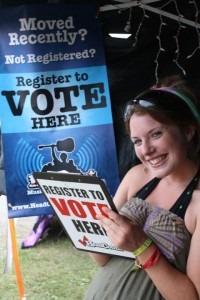A Federal court has put the brakes on a Florida law that had put voter registration groups like HeadCount temporarily out of business in the state.
The Florida statute had threatened voter registration groups with large fines if they did not submit voter registration forms within two days of receiving them. That, and other requirements, had pretty much ground voter registration to a halt in the Sunshine State, and led The League of Women Voters, Rock the Vote ant the Student PIRGs to seek an injunction.
The court held that there was no legitimate state purpose sufficient to warrant the rules and requirements. Here's the crux of it:
First, the court tackled the 48- hour deadline organizations have to deliver completed forms within. It held that, not only was the deadline impractical and arbitrary, but it was also vague. Did the forms need to be delivered in two days, or just postmarked within two days? No one knew, and therefore no one could even try meeting the deadline using U.S. mail. The court found the law violated the National Voting Rights Act, which requires a state to accept voter registration applications sent through the mail.
Additionally, the court held that it was overly burdensome to require anyone working on a voter registration drive - including volunteers - to register with the state. The statute required that any change in information, such as a volunteer’s departure, must be reported within 10 days. However, volunteers leave and come back, and organizations have no way of knowing precisely when a volunteer has stopped working with them.
Furthermore, the court put the kibosh on requiring each "registration agent" to file a sworn statement that the agent “will obey all state laws and rules regarding the registration of voters.” The court found this provision to lack any kind of state interest, other than discouraging volunteers to engage in working for voter-registration organizations.
Finally, the court held that the requirement to file a report of all forms sent out and received by organizations by the tenth of the month, including during months when no forms were sent or received, was overly burdensome and lacked a legitimate state interest. The court reasoned that because these forms are available over the Internet, requiring organizations to count all forms they send and receive is overly burdensome. However, the requirement to provide an organization form and specific identification on each form was upheld, on the basis that any errors could be traced back to the respective organization and would serve an educational purpose. Additionally, the requirement to submit forms in an electronic format was not found to be overly burdensome and was also upheld.
So this was not a total victory for voter registration advocates. But in a year when multiple states have enacted laws alleged to restrict access to the polls, cheers could be heard from the offices of The League of Women Voters, Rock the Vote, the Student PIRG's, and - of course - HeadCount.
